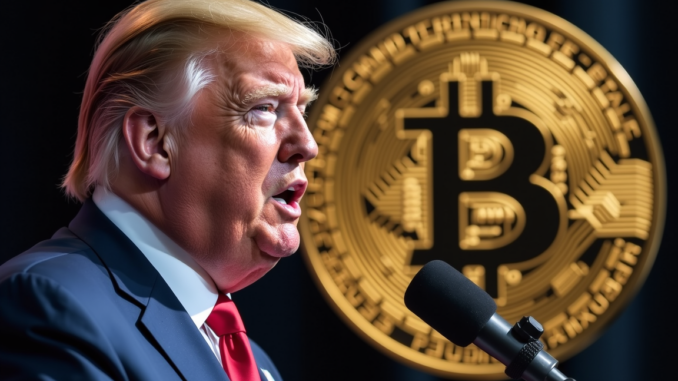

- A bipartisan stablecoin bill (GENIUS Act) faces Senate roadblocks due to Democratic concerns over Trump’s crypto ties.
- Democrats cite Trump’s memecoin, stablecoin involvement, and potential Binance stake as raising conflict-of-interest issues.
- Nine Senate Democrats (including previous supporters) now oppose the bill’s current form, demanding stronger safeguards.
What recently appeared as a rare opportunity for bipartisan agreement on cryptocurrency regulation has hit a significant roadblock, directly attributable to President Donald Trump’s expanding personal and business entanglements within the digital asset space.
Congressional Democrats, citing concerns over potential conflicts of interest and personal enrichment, are now expressing strong reservations about advancing landmark stablecoin legislation, jeopardizing its path forward.
The legislation in question, the Guiding and Establishing National Innovation for US Stablecoins of 2025 (GENIUS Act), successfully cleared the Senate Banking Committee in March with support from both parties, signaling a potential quick win for the crypto industry seeking regulatory clarity.
However, momentum has stalled as scrutiny intensifies over President Trump’s various crypto endeavors.
These activities include the pre-inauguration launch of his own $TRUMP meme coin, reported involvement with a new stablecoin (USD1) via the Trump family-backed World Liberty Financial, suggestions of a potential family stake in the major exchange Binance (linked to an Abu Dhabi investment deal using USD1), and a partnership between the Trump Media & Technology Group and Crypto.com.
Furthermore, an upcoming dinner exclusively for top holders of his meme coin has drawn criticism, reportedly even raising eyebrows among crypto-supportive Republicans like Senator Cynthia Lummis.
Democrats pump brakes on stablecoin bill
This backdrop prompted nine Senate Democrats, including notable figures who previously voted for the bill in committee, to issue a statement over the weekend declaring they would not support the GENIUS Act in its current form.
While their official statement highlighted necessary improvements – citing the need for “stronger provisions on anti-money laundering, foreign issuers, national security, preserving the safety and soundness of our financial system, and accountability” – other prominent Democrats linked their opposition more directly to the President’s actions.
“Since the committee vote, president Trump’s aggressive efforts to profit from stablecoins and the obvious opportunities for bribery and other influence peddling have demonstrated why it is vital that we make meaningful, substantive reforms to the bill,” stated Senator Elizabeth Warren, a leading voice on the Banking Committee, in a Monday speech.
Pushback extends beyond stablecoin specifics
The resistance reflects a growing unease among Democrats about potentially legitimizing or facilitating activities they perceive as problematic.
The concern isn’t necessarily directed at stablecoin regulation itself – the senators’ statement acknowledged that “the absence of regulation leaves consumers unprotected.”
Rather, the opposition targets the current legislative vehicle in the specific context of the President’s apparent conflicts.
Democrats appear unwilling to lower regulatory guardrails or advance crypto legislation that could be seen as enabling potential corruption at the highest level.
Further underscoring this sentiment, Democratic Senator Jeff Merkley introduced the “End Crypto Corruption Act” on Tuesday.
This proposed legislation aims specifically to prohibit the president and other high-ranking federal officials from issuing, sponsoring, or endorsing digital assets.
“Currently, people who wish to cultivate influence with the president can enrich him personally by buying cryptocurrency he owns or controls,” Merkley asserted in a statement accompanying the bill’s introduction.
Implications for broader crypto regulation
The impasse over the stablecoin bill casts a shadow over prospects for more comprehensive crypto market structure legislation, something the industry has sought for years.
The political friction generated by the President’s crypto ties makes navigating any crypto-related bill more challenging.
Representative Maxine Waters, the leading Democrat on the House Financial Services Committee, also signaled resistance this week, objecting to a joint hearing intended to address these broader market structure issues.
Financial policy analyst Jaret Seiberg of TD Cowen viewed the situation primarily through a political lens, noting that Trump’s personal stake complicates Democratic support for a bill potentially regulating his family’s business interests.
However, he still predicted the stablecoin bill could eventually pass, potentially after Democrats extract significant concessions, given the crypto lobby’s considerable political influence and resources.
Industry lobbyists, meanwhile, appear concerned by the stalling momentum, issuing statements urging lawmakers to move the GENIUS Act forward to provide necessary regulatory clarity, support stablecoin adoption, and maintain US leadership in the digital economy.
The immediate future of the stablecoin bill, however, now appears hostage to the political fallout from the President’s controversial foray into the crypto world.


